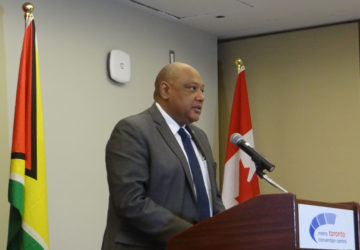Potential foreign investors seeking to do business in Guyana need have no fear of being confronted by local officials seeking favours of them outside the confines of the formal agreements that might exist between themselves and the Government of Guyana, Natural Resources Minister Raphael Trotman told an audience in Canada during a March 5, Guyana Day forum in Toronto.
In an address that spoke to the theme of “government’s initiatives in relation to exploration and mining in Guyana,” Trotman used part of his presentation to seek to dispel such notions as might exist that the process involved in investment negotiations in Guyana was entangled in a culture of corruption and kickbacks.
“Companies are free to invest, explore and extract our resources without fear of political recrimination or of having illicit demands being made of them,” Trotman declared.

The pronouncement came against the backdrop of what in recent years has been the emergency of public comment and controversy linked to allegations that some foreign entities seeking to invest in Guyana had been granted ‘concessions’ and favours outside the framework of their investment agreements in exchange for kickbacks under the previous political administration.
Promoted as a forum designed to further raise Guyana’s investment profile in a key North American location the event attracted an audience that included representatives of Guyana Goldfields Inc, Strata Gold, Romanex, Kilroy Mining, and other mining companies actively working in Guyana as well as representatives of the Guyana Geology and Mines Commission (GGMC) and Chief Executive Officer of the Guyana Office for Investment, Owen Verwey.
Much of Trotman’s address was focused on investment in the extractive sector. Though, mindful it seemed of ongoing serious labour relations and other worker welfare and environmental problems that have long plagued foreign-owned operations in the country’s bauxite industry, Trotman sought to remind of government’s key conditions for investment including the requirement of “leaving behind strong infrastructure, a more professional workforce than that found,” the desirability of “practicing good environmental behaviour that can be used as a global model” and demonstrating “tangible levels of corporate social responsibility…” He added, “The governments of the countries where the companies come from must respect our sovereignty as we respect theirs.”
Trotman, meanwhile, used his presentation to draw investor attention to what government says is a paradigm shift in its approach to the exploitation of the mining sector that is underpinned by a policy that focuses on the “greening of Guyana.” Declaring that investors’ extractive pursuits must be carried out “with a minimum of disturbance and destruction to the environment” Trotman alluded to “a revised and updated Ministry of Natural Resources Strategic Plan covering the period up to 2020” which he says will see policies relating to conservation, management, protection and sustainable development of both the country’s forestry and mineral resources being harmonized. Targeting the gold-mining sector specifically, Trotman said the evolution of a more environmentally sensitive policy will witness “a focus on the reduction of mercury use and the promotion of better mining techniques for greater gold recovery.”
The Government of Guyana’s commitment to this goal, Trotman told investors, is reflected in its implementation of an initiative supported by the UNDP and the Global Environment Fund (GEF) that seeks to mainstream biodiversity through strengthening of the country’s monitoring and implementation capacity in order to “reduce biodiversity loss and maintain ecosystem functionality.”
And according to Trotman government is making clear its expectation that “companies already working and planning to work in Guyana, support its green gold initiative.” Accordingly, investors are expected to buy into work already started by government on “mainstreaming reclamation/rehabilitation… on mined-out areas” and “creating plant nurseries to help with replanting of sites.” The minister also alluded to the country’s “ever growing” Mining School which he said had trained more than 300 miners to better understand the “greening” policy in the sector in 2016.
Trotman conceded, meanwhile, that Guyana still faced the challenge of being unable to offer reliable data on the location of mineral deposits, a facility that could accelerate investor interest in the sector. “We endeavour to improve the level of data through geochemical projects… 2017 is a year for focus on geological surveys through partnerships, both new and old, to develop a mineral sector that is prepared and responsive to the needs of its stakeholders,” Trotman added.




